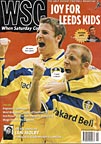 Relieved to see the end of Peter Johnson's reign at Everton, Neil Wolstenholme hopes for better times at Goodison Park
Relieved to see the end of Peter Johnson's reign at Everton, Neil Wolstenholme hopes for better times at Goodison Park
Given the many false dawns over the past year I will only believe that Bill Kenwright has bought Everton when Peter Johnson’s shares are safely transferred. As Kenwright is a current director of the club, the process of due diligence, allowing for the books to be examined before the deal is a concluded, should not be a problem. A bigger concern for many fans lies in the identity of the new owner’s possible backers, rumoured to include marketing moguls the Barclay brothers and the corporate raider Philip Green, recently linked to an attempted takeover of Marks and Spencer. It is to be hoped Kenwright will identify his partners as soon as possible.
Fans of all clubs should be worried by what happened to Everton and Tranmere. As a majority shareholder, surrounded by his coterie of friends in executive positions, Johnson was never likely to be held to account by Everton’s other part-time, non-executive directors. Sadly, they showed little desire even to make the attempt when it might have done some good.
That Johnson was able to sit on his majority shareholding in both Everton and Tranmere, defying a string of FA and Football League rules with seeming impunity, highlights serious weaknesses in the governance of the game as a whole. Peter Kilfoyle MP and leading members of the Everton Independent Shareholders Association, Tony Tighe and Professor Tom Cannon, all spoke out on this theme but the football authorities’ response boiled down to the admission that they were powerless.
Several supporters got so fed up that we formed Investors in Everton in an attempt to find a solution. If nothing else, this fan intervention helped to shift the focus on to the mismanagement of the club and the need for investment and organisational change. The club’s independent shareholders urged Everton’s directors to go for a one-to-one rights issue, doubling the number of shares in issue and raising up to £35 million in new capital.
If this had taken place, Johnson would either have had to cough up to buy new shares to maintain his shareholding percentage or give others the opportunity to buy the newly created shares. If all such shares were sold to parties other than Johnson, his stake in the club would be diluted to 34 per cent, meaning he would lose effective control. This move would have been difficult to block without risking a high court challenge from the other shareholders.
The Independent Supporters Association also rallied around and forced Johnson to meet them by threatening to picket his main business, Park Foods – whose share price was already under severe pressure – and organise consumer boycotts. Another group, the Everton Fans Trust (www.efctrust.org), was launched in November. Fans were asked to buy units in the trust costing £1,000 each. The Alliance & Leicester were to lend the trust £1,000 for every fan who signed up to save £20 a month for five years. The organisers believed Everton’s worldwide fanbase could raise sufficient capital both to acquire overall control and to put in place the neccesary capital to fund investment in the club. The overall message to Peter Johnson was simple – cut your losses and do business with the fans.
The main possible drawback of this initiative is that the trust currently has an all-or-nothing stance, with its stated purpose being either to acquire a majority shareholding in the club or dissolve, returning the money to the fans who have invested. If this approach can be adapted to enable them to combine with other supporter-led initiatives there is real hope that this strategy can still play a role in the future.
Everton are an estimated £13m in debt and this is expected to be nearer £20m at the season’s end, the stadium needs major renovation or replacement, there is a building site that should be the youth academy and the squad has been pared to the bone. Serious investment is needed, certainly more than Bill Kenwright and his backers can fund on their own.
There are signs that the messages the various fans groups have spelt out have hit home. Bill Kenwright looks to have acquired the club at a price Investors in Everton pushed for from the outset. Club chairman Sir Philip Carter has already hinted that fans will be invited to participate in a new share issue, and Bill Kenwright is on record as saying that he would inviting leading independent shareholders on to the board. The early signs are hopeful but Everton’s new owner will ultimately be judged by his willingness to meet the aspirations of the fans who have sustained the club through a period of turmoil and decline.
From WSC 156 February 2000. What was happening this month